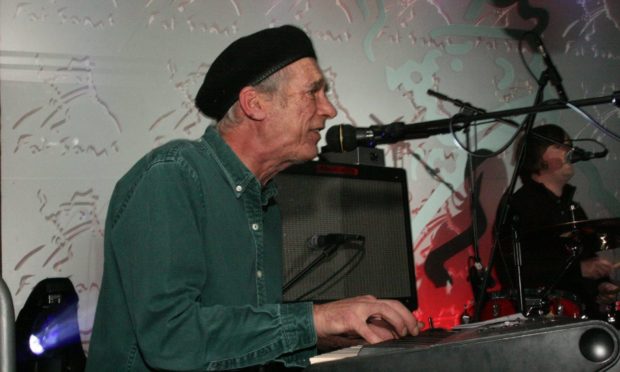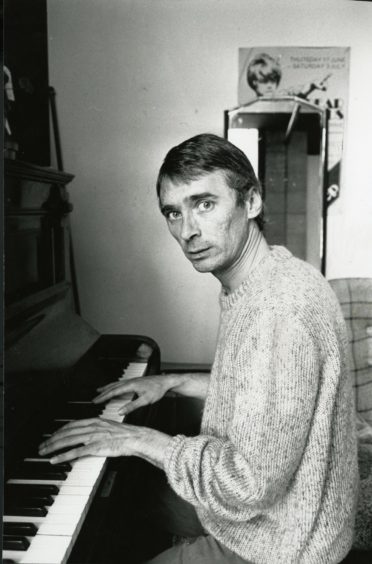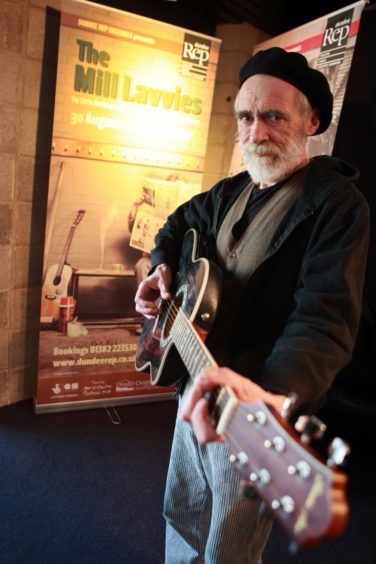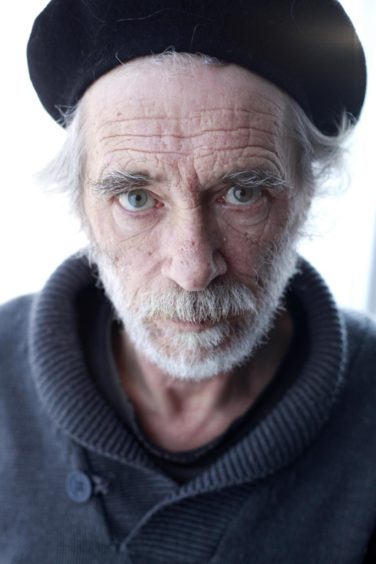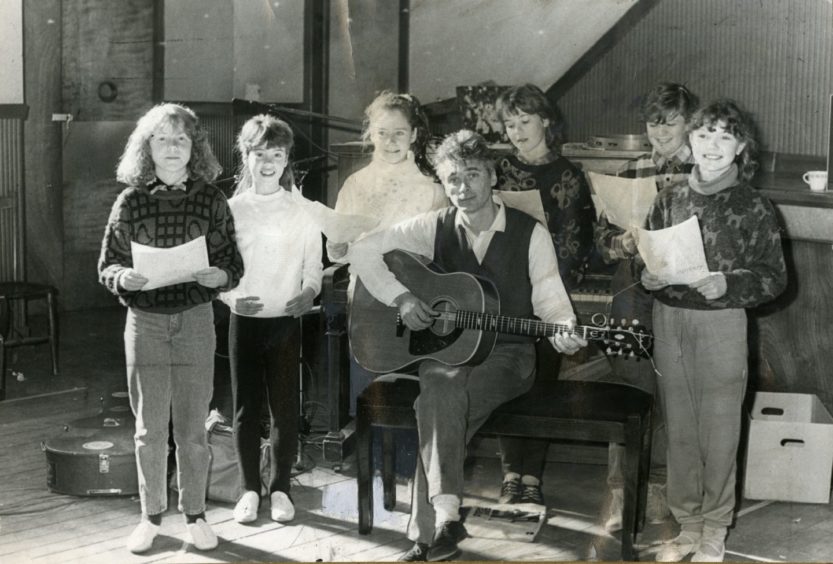It was a project plagued by tragedy and one which might never have seen the light of day, but for the global pandemic.
Mike Gibb’s venture began life as a musical and was later developed into a stage play, but only now has it emerged as a novel, Just Another Seterday in Dundee, inspired by the unique creations of singer-songwriter Michael Marra.
The latter redoubtable figure, who earned the moniker Bard of Dundee with his idiosyncratic perspective on the world, became a popular performer within and beyond the folk music scene, which led to him working as a support musician for A-listers such as Van Morrison, The Proclaimers, Barbara Dickson and Deacon Blue.
And his song Hermless, which was even mooted as a potential Scottish national anthem, struck an almighty chord with Mr Gibb who discussed the notion of composing a musical when the two men met in the north-east more than a decade ago.
However, the plan was abruptly abandoned when Mr Marra fell seriously ill and subsequently died of cancer at the age of just 60 in 2012.
It was a crushing blow and the script lay untouched for several years thereafter. But now, the basic material has been adapted into a work of fiction wherein the author has striven to do justice to one of Scotland’s most distinctive and quixotic personalities.
And we have had the first look at how the turbulent project has turned out.
From Fintry to the Taybridge Bar and Tannadice
It has a scenario and settings which will be instantly familiar to those who have grown up in the city of jam, jute and journalism.
As the book relates: “It was just another Seterday in Dundee. Just another Seterday in the tidy, two-storey terraced council house in Fintry Drive.
“Just another Seterday, like hundreds of them before, for the Webster family. But little did they know that the day would change all of their lives. Forever.”
The plotline revolves around two sisters. There’s Kate, who lives in Fintry with her husband, Tommy, who prefers to spend his time in the Taybridge Bar or at Tannadice, and their sons, the jack-the-lad Darren and shy, introverted “hermless” Alistair.
Then, there’s Maureen, who “rattles around” her large villa on Clepington Road, waiting for her “workaholic” husband Richard to return home to her. And his tropical fish.
As you might have detected, it is not a conventional tale of everyday life, but a story which twists and turns in myriad directions and evokes a variety of different emotions.
And Mr Gibb is hoping he has captured the spirit of the late, lamented Marra, who attended LawsideAcademy prior to leaving school at 15 and trying a variety of trades – including electrician, baker and builder – as the prelude to heading to the folk clubs of London and performing in the band Hen’s Teeth with fellow Scot, Dougie MacLean, the man who penned the internationally-renowned anthem Caledonia.
The duo travelled to the city at a time when punk was in the ascendancy, but Michael was never concerned about following the herd, chasing hits or Top of the Pops appearances, or generating controversy for its own sake.
On the contrary, he methodically, crafted songs which remain enduring and ensure that his LPs and CDs can still be found in so many people’s record collections.
‘Naebody’d notice if I didnae come home for my tea’
Mr Gibb, who has produced several stage plays and books, ranging from Forgotten Heroines of the North-East to Outlander: the Musical and Heroes of the Halbeath Road, has explained the reasons behind the protracted gestation period of his novel.
He said: “It has been a tortuous road getting Just Another Seterday… to this point. For a long time, I have been a huge fan of Michael Marra and one of my particular favourites of his amazing catalogue of woinderful songs is Hermless.
“Many people seem to regard it as comedic, but I think it is achingly sad and especially the final verse which is quoted at the start of the book.
“This is: ‘Naebody’s notice if I wisnae there, If I didnae come hame for my tea’.
“I felt that the idea of a musical play, which was built around some of Michael’s songs, with Hermless inspiring the central character of Alistair, had potential and, as chance would have it, I had arranged to pick up Michael from Aberdeen railway station to take him to Dyce airport for a flight up to Shetland.
“While we were chatting in the car, I broached the subject of using his songs for such a venture. Being an ever generous individual, he instantly agreed to my proposal and he even offered to provide additional songs if they were required.”
Everything looked set fair for the play, but then…
He continued: “I produced the first draft of a script which incorporated a whole host of Marra standards including songs such as I Don’t Like Methil, Angela Gunn, All Will Be Well and Muggie Sha, a wonderful bit of writing.
“A semi-staged reading in Dundee went very well, so much so that I approached Dundee REP, with whom I had worked on my other themed musical plays such as Mother of All the People, Five Pound & Twa Bairns and Sunday Mornings on Dundee Law, and they were keen on it being staged at the venue.
“But sadly, before we could get it to the REP, Michael passed away and it no longer seemed appropriate to proceed with the show.
“After a couple of years spent gathering dust, I finally returned to the basic script, because I liked the storyline and I reimagined it with Michael’s songs being replaced by a series of originals, for which I had written the lyrics and composer, actor and director, Malcolm Dowie, agreed to work on the music.
“But then, tragedy struck for a second time as Malcolm died at an early age, and I decided just to shelve the project.
“But for the impact of Covid and the lockdown, that might have been the end of this particular story. But with no theatre works being feasible and little else to take up my time, I returned to it yet again, and decided to convert the stage play into a book.
“I did think of calling the book Hermless, but I thought that would be exploiting Michael. Instead, this can best be described as a book inspired by the song Hermless.”
Mr Gibb has poured his heart and soul into bringing the enterprise to fruition and displayed many of the qualities which shone in his previous literary undertakings.
It hasn’t happened overnight, but the chances are that admirers of Michael Marra will find plenty of things to admire and cherish from this Seterday night fever.
Mike has worked hard to showcase little-known talent
In the past, Mike Gibb has highlighted the often unheralded men and women who have made their mark on north-east Scotland, whether in sport, art, science or politics.
He was especially interested in the fascinating story of Strichen-born Lorna Moon, a writer in the early 20th century who watched an early film by the renowned Cecil B DeMille, thought it was awful, and wrote to the director to tell him so.
She was surprised to receive a response from the great man which basically amounted to him laying down the gauntlet: “Well, if you think you can do better, prove it.”
But, as one of life’s steely characters, she packed her bags, said goodbye to her common law husband, Walter Moon, and headed off to California.
And, as Mr Gibb related: “During the 1920s, she became one of the highest-paid female scriptwriters in the industry, responsible for the likes of Mr Wu, Women Love Diamonds and one of early cinema’s biggest hits, Love, which starred the great Garbo.
“She also worked with some of the top stars of the era, including Gloria Swanson, Lon Chaney and Norma Shearer.
“I believe that if she hadn’t died so young – in 1930, aged 43 – she would have gone on to become one of Scotland’s great literary figures and would now be revered just like Lewis Grassic Gibbon rather than being largely unknown.”
Proceeds from the new book will help charity
Mr Gibb has donated a lot of money from his literary works to charitable organisations. And he confirmed he will follow suit with Just Another Seterday in Dundee.
He said: “The proceeds from this book will be donated to the Bianca rescue shelter in Sesimbra in Portugal, with whom I have been associated for many years.
“They currently care for 400 rescued dogs and 100 cats and most of my other books have also been written to benefit the shelter, which does a fantastic job.”
Further information is available at mikegibb32@outlook.com
